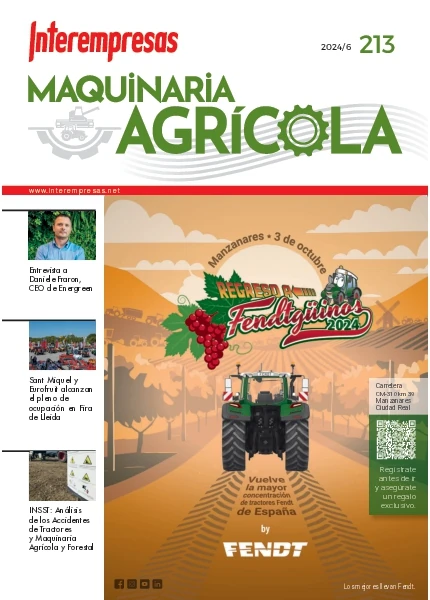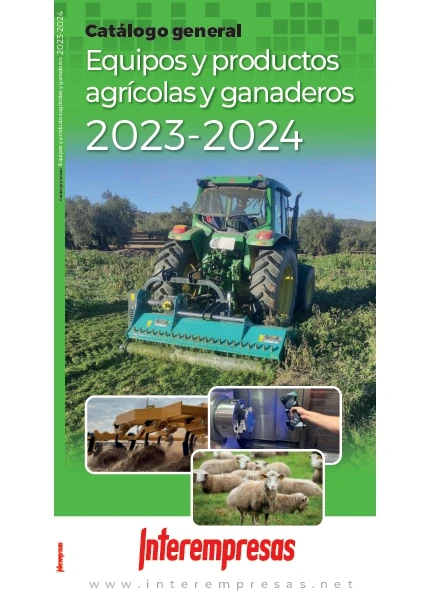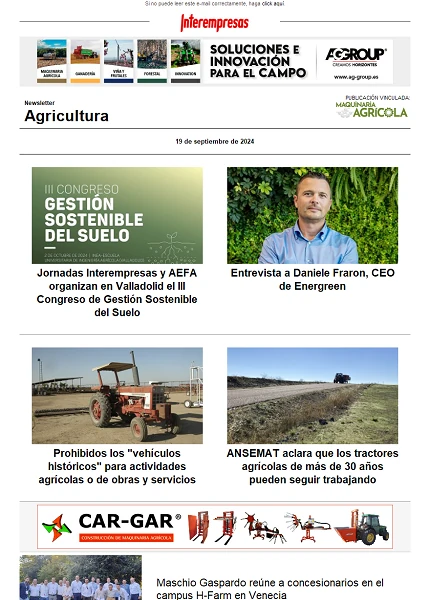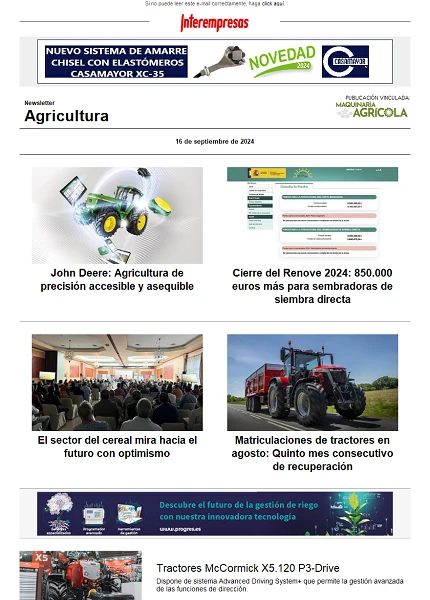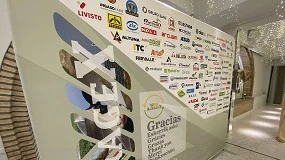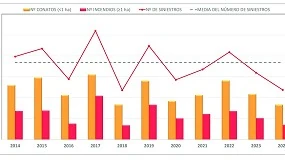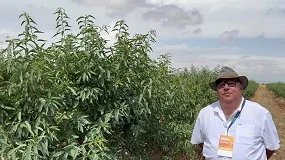España, líder en cultivo de productos bio en la UE, exporta el 80% de la producción
7 de junio de 2010
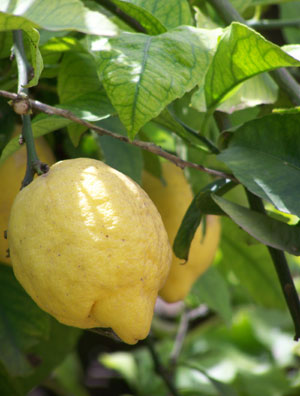
A lo largo del pasado ejercicio, la superficie destinada a la agricultura ecológica registró un ‘empujón’ de un 21,64%. Es decir, se cultivaron 1,60 millones de hectáreas de productos bio, comparados con los 1,31 millones de hectáreas dedicadas a esta actividad en el año 2008. Este crecimiento, según la ministra de Medio Ambiente y Medio Rural y Marino, no se limitó al área de cultivo. También se observaron incrementos en el número de operadores vinculados al sector, al pasar de 23.473 durante el año 2008 a unos 27.627 a lo largo del año pasado (un 17,70%). Así lo confirmó la titular del Marm a mediados del pasado mes de mayo, cuando hizo públicos estos datos facilitados por las autoridades competentes de las distintas comunidades autónomas. Unas cifras que muestran el buen momento que atraviesa este segmento comparado con otras campañas cuyo cultivo se ha visto mermado por el incremento de los costes de producción y el abandono de las plantaciones. El interés por lo bio también alcanzó, de lleno, a la ganadería ecológica. Así, el año 2009, supuso un periodo de bonanza, en el que el número de explotaciones ganaderas fue de 4.548, un 19,28% más.
El cultivo ecológico creció en Castilla la Mancha a un ritmo superior al 100%
La diversidad de climas, culturas, áreas agrarias, sistemas de producción del país ha facilitado que la producción ecológica esté presente en todas las comunidades autónomas, adaptándose a las condiciones específicas de cada una de ellas. De vuelta a los datos del año 2009, facilitados por el Marm, se deduce que la superficie de cultivo aumentó, en particular, y en valores absolutos, en Castilla la Mancha. En conjunto, el área manchega inscrita como ecológica ascendió a 246.076 hectáreas, lo que representó un crecimiento del 105,63% respecto al año 2008. Sin embargo, Andalucía se sigue llevando la palma en cuanto a superficie inscrita. A finales del año pasado, la comunidad andaluza ostentaba un total de 866.799 hectáreas, lo que supuso un incremento del 10,55%, en comparación con el año anterior.
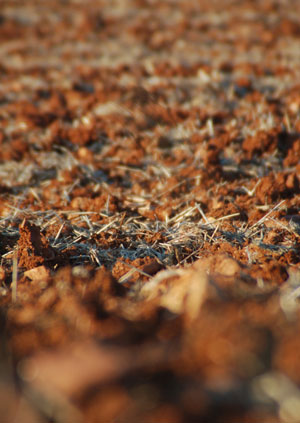
Otras comunidades autónomas que no se quedaron atrás fueron: Extremadura con 115.018 hectáreas, lo que supuso un 34,04% más y Cataluña con 71.734 hectáreas (un 15,09% más). En el polo opuesto, se situó Aragón que experimentó un ligero retroceso respecto al año 2008, quedándose con 66.730 hectáreas de producción ecológica. Por debajo, se situaron Murcia con 60.742 hectáreas y un crecimiento del orden del 61,55% y la Comunidad Valenciana que posee 38.754 hectáreas de cultivo bio (un 7,30% más). Este entusiasmo se contagió incluso a las comunidades pequeñas o uniprovinciales que también aumentaron en superficie ecológica. Actualmente, el País Vasco cuenta con 1.848 hectáreas; Madrid 6.043; Cantabria 5.796 y Asturias, el caso más destacable, destina 14.019 hectáreas, duplicando la superficie inscrita en solo dos años.
Bosques, pastos y praderas, que representan un total de 1,03 millones de hectáreas, resaltan en cuanto a orientaciones productivas de la agricultura ecológica española. En concreto, se registraron aumentos del 21,51% para lo que ha sido considerado la base de la ganadería ecológica. Asimismo, se cultivaron 571.981 hectáreas de superficie agrícola ecológica, un 21,78% más comparada con la campaña anterior. Por tipología de cultivo destacaron los 183. 458 hectáreas que se destinaron a cereales, un 10% del área total inscrita y olivos con 127.040 hectáreas, es decir, un 7,93%. A continuación, se produjeron frutos secos en 87.335 hectáreas y viñas en 53.958 hectáreas, con aumentos del 24,65% y el 74,87%, respectivamente. Otras producciones pequeñas en superficie, pero de interés por su impacto económico fueron los frutales y cítricos, hortalizas, tubérculos y legumbres secas.
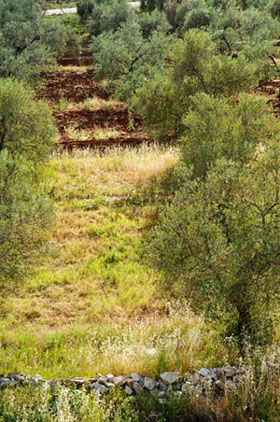
Sube también el número de operadores vinculados a los productos ecológicos
En lo que se refiere al número de operadores, cabe destacar también un crecimiento del 17,70% hasta los 27.627 divididos en diversas categorías. Por un lado, los 25.291 productores del sector primario; por otro lado, los 2.465 elaboradores y finalmente un total de 93 importadores. Igualmente, se cuantificaron 714 operadores como comercializadores 'no importadores', básicamente almacenistas e intermediarios. En este cómputo, no se repitieron aquellos operadores que realizaron más de una actividad, según el tratamiento de datos a cargo de la Oficina Estadística de la Unión Europea (Eurostat). El incremento global en el país, fue del 13,70% en el caso de los elaboradores y del 18,79% en cuanto a los productores. En función de la localización geográfica, el mayor número de operadores se ubica en Andalucía, con un total de 8.444 agentes, un 3,93% más respecto del ejercicio 2008. A continuación, se colocaron Castilla-La Mancha (4.896), Extremadura (3.743) y Murcia (2.393). Por debajo, figuraron otras comunidades autónomas como la valenciana (1.533) y la catalana (1.431operadores). Por el contrario, las comunidades con menos operadores fueron Cantabria y País Vasco con 161 y 244 cada una. Ambas, sin embargo, experimentaron avances significativos del orden de un 11,81 y de un 2,95%, respectivamente.
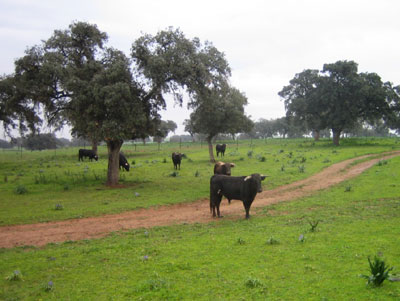
Bosques, pastos y praderas destacan como emplazamientos productivos de agricultura bio y son la base para la ganadería ecológica. En la imagen, un paisaje sevillano. Foto: Sara Connor.
Buenas noticias también para la ganadería ecológica
La ganadería ecológica no podía ser menos. Durante el año 2009, se registraron un total de 4.548 explotaciones ganaderas, un 19,28% más que en la temporada anterior. Por lo tanto, sobresalieron las 2.106 de vacuno de las que 2.023 fueron de carne y 83 de leche. Ambas, comprendían entre 124.026 y 3.978 cabezas, cada una. Por debajo, se situaron las de ganado ovino, con 1.168 explotaciones de carne y 40 de leche; y el caprino, a base de 355 explotaciones de carne y 42 de leche. También se registraron 145 explotaciones de porcino y de avicultura, distribuidas de la siguiente forma: 46 de carne y 137 de huevos. Asimismo, también se inscribieron 190 establecimientos apícolas. Por primera vez, hubo constancia de 309 explotaciones de équidos y tres de acuicultura.
Cataluña y Andalucía destacaron por su abundante tejido industrial ecológico
En general, el total de industrias transformadoras y elaboradoras de productos ecológicos vinculadas a la producción vegetal, fue de 2.475 empresas en el año 2009. En función de la categoría, las industrias de manipulación y envasado de productos hortofrutícolas frescos (2.475) encabezaron este ranking , seguidas de las bodegas y embotelladoras de vinos, almazaras y envasadoras de aceite (408), empresas de panificación y pastas alimenticias, (233), conservas y zumos (168) y manipulación y envasado de frutos secos (100), entre otras. Según la comunidad autónoma, Cataluña, con 518 empresas y Andalucía con 502, seguidas de la Comunidad Valenciana con 349 establecimientos, se situaron a la cabeza en cuanto a tejido industrial ecológico. Por su parte, las empresas relacionadas con la producción animal bio alcanzaron la cifra total de 567, principalmente mataderos y salas de despiece (124), leche, quesos y derivados lácteos (109) y, finalmente, 107 envasadoras de miel. En menor número, cabe citar también las 50 industrias de embutidos y salazones cárnicos, las 49 de acondicionamiento de carnes frescas, las 47 de manipulación y envasado de huevos frescos e igualmente 47 fábricas de piensos. En este caso, Andalucía lidera la lista de industrias destinadas a la producción animal, con 144 establecimientos y una subida del 105,71%, duplicando el número registrado en el año 2008. A continuación, se situaron Cataluña con 139 fábricas cuyo aumento también fue notable, de un 43,30%. Como novedad, se incluyeron 10 industrias ecológicas de elaboración y conservación de pescado, crustáceos y moluscos.
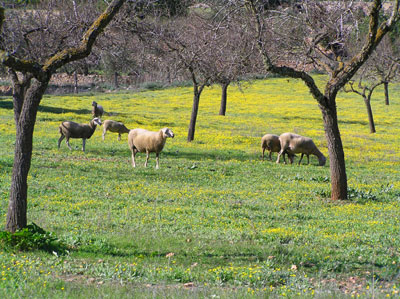
Por segundo año consecutivo, España se situó a la cabeza de la Unión Europea en producción agrícola bio y en sexta posición a nivel mundial, detrás de Australia, Argentina, Estados Unidos, China y Brasil. Algo a lo que hizo referencia la ministra de Agricultura y Medio Ambiente, Elena Espinosa. Para la titular del Marm, el conflicto reside en lograr aumentar el consumo interior, ya que el 80% de la producción se comercia con otros países.


